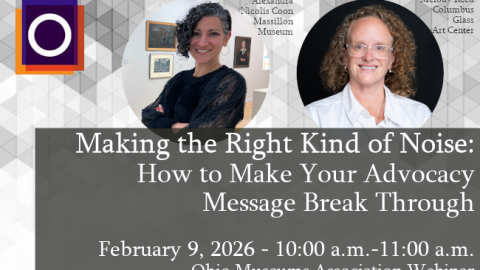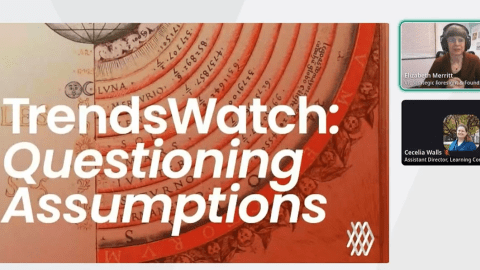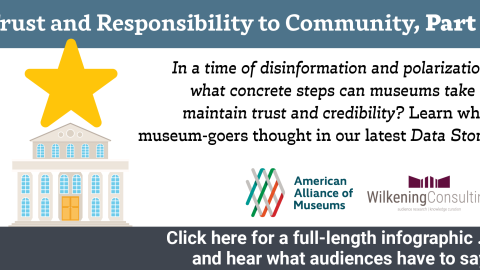How much are you willing to give up to work in a museum? How much didyou give up to work in a museum?
I’m not talking about quality of life issues like relocating to a new city, having to explain over and over again, at parties, what a “registrar” is, or spending the day in a windowless cubicle tucked in next to collections storage. I’m talking about cold hard cash.
My head is filled with museum wage data because I’ve been proofing the text of the 2014 Museum Salary Survey (coming soon to the AAM Bookstore). Serendipitously, while taking a break from all those numbers, I read an article in the NYT also related to pay.
“Will Portland Always Be a Retirement Community for the Young?“ explores the motivations that lead well-educated young people to flock to that city, despite the dearth of jobs. Synopsis: many people are evidently willing to sacrifice income for “vibe.” They choose to live on a barista’s wages, rather than find a higher-paying job that actually uses their degree, in order to enjoy “a politically open culture that supports gay rights and the legalization of marijuana — in addition to the right of way for unicyclists or the ability to marry in a 24/7 doughnut shop.”
What caught my eye was an attempt to quantify this seemingly irrational decision making. “David Albouy, an economics professor at the University of Illinois” notes the article, “has created a metric, the sacrifice measure, which essentially charts how poor a person is willing to be in order to live in a particular city.”
I think we need to work out a similar measure quantifying how poor people are willing to be in order to work in a museum.
There are a lot of highly educated, seriously smart people working in museums: among the salary survey respondents 90% earned at least a bachelor’s degree (compared to 30.4% of the general population). In some positions, such as director, curator, educator, well over half of museum workers have a graduate degree, compared to 10.9% of the general populace. I suspect that lurking in the back of the psyche of many museum folks is the belief that, given our smarts and the time and money we put into higher education, we could have chosen a more lucrative profession. (I know my dad not-so-secretly hoped I would become a doctor. When I took my first museum job, which paid $12,500 per year, he was, shall we say, less than thrilled.)
This sacrifice measure is important because it has a pernicious influence on many aspects of our field. It depresses wages, since we have, in effect, an oversupply of highly qualified people willing to underbid each other in return for the non-financial benefits of museum work. I suspect that low wages, in turn, contributes to a lack of diversity in the field. And I fear that the psychology of sacrifice helps create a culture of entitlement in which people feel that what they bought with the money they left on the table—the wages they could have had as doctors or lawyers or business consultants—is autonomy. Not everybody, clearly, but enough people that I run into this attitude, voiced or implied, at every conference I attend, at many of the museums I work with.
Some are people who have spent years (or decades) becoming experts in their scholarly fields. They’ve put in their time, paid their dues, and matured into positions where they can do work they know to be excellent. So they may listen to colleagues enthusing about the need for participatory engagement, crowdsourced input and the curator as facilitator and feel, quite reasonably, that somebody moved their cheese. Some, whether or not they themselves are scholars, went into the field to help create the kind of museum experience they fell in love with—a traditional experience of scholarship and quiet contemplation—and are frustrated to find that not everyone loves (or is willing to support) that tradition.
In the US, where museums do not, by and large, receive a majority of their budget from the government, we are subject to the same market forces as any other business. Even within the constraints of our mission, we have to provide an experience people are willing to pay for, preferably because they actually enjoy that experience, or at least because they are willing to support it as an abstract good. And yet, over and over I have conversations with people who feel aggrieved that no one is willing to pay them for what they want to produce. And resentful that they aren’t paid a wage they feel reflects their real value to society.









Super interesting and possibly on target.
But I wonder: what if we were in an industry where everyone was incredibly well-paid? Don't people in Hollywood also think they have the autonomy to put whatever they want on the screen – even as the country's demographics shift away from white male superheroes? I think love of autonomy could as easily be connected to ego as to pay sacrifice.
Interesting point, Nina. Unfortunately, I don't have first-hand experience with "incredibly well-paid" fields, but I will out on a limb and speculate. You chose Hollywood as an example, so let's go with that.
In film, there is still tight economic coupling between product and consumer, but the feedback is massively delayed. (By the time you know whether people will buy tickets, you've already blown through your production budget.) While in the short term, a director can indulge his or her vanity projects, anyone who consistently produces "Ishtars" will lose their ability to attract investors.
At the indie end of the spectrum, sometimes directors and actors are willing to pony up their own money, or forgo salary, to work on projects they believe in. That is THEIR sacrifice measure–they are putting their money on the line in return for artistic freedom, knowing that the end product may never be a commercial success.
As to white male superhero films, there clearly is a large, global, paying audience for this genre, so in that case ego (or personal preferences) may align with the market. What producers of these films are passing up is potential income from underserved audiences (such as women, or people of color), but that is a lost opportunity cost, which is largely invisible and pretty speculative.
Will share more thoughts as they bubble up to the surface.
It might be interesting to think about this in light of Ben Davis' 9.5 Theses on Art and Culture. Davis discusses recent debates in the art world in which some artists/collectives/activists, believing they should be compensated for their work, have called for artists to unionize. But Davis says that it doesn't make sense for artists to consider themselves working class, despite their low wages; artists, because of their autonomy to produce their own creative work, are closer to the concept of the middle class (at least in Marxist terms). In this sense, an artist is more like a small business owner than a laborer; although beholden to market pressure (like everyone else in the world), an artist is his or her own boss.
My summary might be overgeneralizing a bit—check out this review or the book itself for a better explanation—but it is an interesting theoretical framework to think about museum work. We get into museum work because we are excited about the creativity and autonomy we believe it will it afford us (just as an artist chooses to make art for the same sense of creativity and autonomy). But maybe it's that we don't actually have that autonomy after all. (It's interesting to note that my colleagues at one of my previous museums were all a part of a union.)
Okay, maybe this theoretical leap is one hop too far, but I hope that sparks some good thinking.
I worked at a Museum that is an AAM member. While there I was a victim of wage theft. I informed the AAM and the response I got was that, "The Alliance does not get involved in or comment on personnel or employment issues."
So, the question should also be how low is the Alliance willing to let museums operate on a legal level before it becomes a matter of concern.
Just noting for some blog-only readers: this post has been the subject of robust exchange on Twitter.
Responding to a tweet about this post here (since I can't compress my replies into 140 characters. I tried. Truly.)
In response to @NinaKSimom's summary of the original post ("Thought bomb from @futureofmuseums: does making salary sacrifices make museum staff more resistant to change?") @Mia_out observed "in which case technologists should be most resistant of all? But we're the ones pushing for org change."
I agree, @Mia_out, I find museum technologists usually have very few inhibitions about challenging norms and trying experiments. On the other hand, they don't have any norms to push against–they ARE the change reshaping museums. OK, they personify the changes shaping museums. As I have noted about my own position as a museum futurist "no one can tell you you're doing it wrong if you invented the job to begin with." I leave it to you (and your colleagues) to comment on how much pay you feel you gave up to work in museum, and what you got in return for that sacrifice. I'm guessing it has something to do with joy of inventing a role that did not exist before, and of messing about with really cool content. (That is certainly the vibe I got from Micah's recent post on Medium about playing with the Cooper Hewitt API.)
When I encounter the "who moved my cheese" reaction it's from museum staff who occupying traditional roles–they went in with one vision of what being a (fill in the blank) would like, a vision based museum norms that coagulated decades ago.
So my hypothesis would be that museum technology types want to move the museum in the direction market forces are driving it in any case: towards "open" and "participatory"–towards museum as resource and platform. They "sacrifice" for the excitement of being in on the ground floor of that transformation, and (I hope) they get what they paid for. People in traditional roles may feel they paid for one thing (authority, intellectual freedom to pursue their own research interests) and instead ended up with a mandate to change that role into very different. Does that make sense?
There's also this from Sydney, Australia where the shift to 'professionalise' the customer service staff is causing grief (albeit at pay levels that will make a lot of US museum workers weep! $33 per hour!)
http://www.smh.com.au/entertainment/art-and-design/art-gallery-ad-makes-clear-wish-for-an-educated-staff-20140917-3fz46.html
I think one issue is that there tends to be a pretty large wage gap between the "worker bees" and the admin staff. I hear all the time that we need to be competitive with our salaries for directors, CFOs, etc in order to lure them over from the for-profit world, but at some institutions the discrepancy is ridiculous.
There was a good article in the Nonprofit Quarterly last Monday about the growing concern in both for profit and nonprofit companies about the leader-to-lowest-paid-worker ration. Here is a link:
https://www.nonprofitquarterly.org/policysocial-context/24861-on-guidestar-s-2014-compensation-study-a-nonprofit-call-to-action.html
The author writes "Should this sector more thoughtfully declare itself as supportive of a reasonable ratio between highest- and lowest-paid workers? And shouldn’t it establish a measurable standard of practice that will make the sector beacons for the issue? Or will we just wait around to be dragged kicking and screaming into an issue that we should, by rights, lead on—by example, as well as by word?"
Fascinating article, Seb, thanks for sharing. There is a whole other line of inquiry worth following here: why are front line staff (who often make or break the visitor experience) often either volunteers or low-paid? Does that devalue the importance of the job they do, and lower expectations for their performance?
As the director of a small history museum, I most often encounter the "who moved my cheese?" reaction from long-time volunteers, who are unpaid, but very invested in the museum. I suspect there's more going on than a sacrifice-motivated backlash against loss of autonomy. Yours is a really intriguing idea, though, and will probably provoke much self-examination among museum people: "why *did* I choose a highly satisfying low-paid career?" For me it was the intellectual variety of doing something new every day, problem-solving in twelve different directions (including how to accomplish the organization's goals on a shoestring budget), and the chance as a historian to work not just with documents and students, but with material stuff.
I wonder how much fear of change is motivated by something more basic. Many of us who love working with objects find the idea of working with humans stress-inducing. Public engagement? That will require us to exercise an entirely different skill set that we've never used, or haven't used in a very long time. Add to that that in many ways there's a fundamental disconnect between the needs of collections care and those of the participatory museum, one that museum professionals will be grappling with for some time to come.
Most intriguing, though, is Elizabeth's suggestion that the salary sacrifice may be an important reason for the lack of diversity in the profession. Every week I think about how to mitigate our museum's need for labor but lack of funds: how can I offer more *paying* internships? How can we give existing staff raises and training opportunities like bigger museums (never mind benefits)? I don't have the answers, but I'll keep working on them.
Elizabeth – I think you've made a good point, and it's certainly true that there's a lot of resistance to change in museums. But it's also strong at the few museums that pay their staff very well. The Smithsonian has many curators and others eager to do what they want to do, not what the organization needs, because they think it's what the organization should be doing. So there are other reasons, beside low pay, that drive the sense of entitlement. Worth exploring further.
I would add that some go into the museum field because they believe it is important to conserve and educate about the objects and issues of cultural heritage. Like other activities in the realm of "social responsibility", the expectation is then is one of sacrifice in the service of something….rather of autonomy or creativity. Work tied to doing "good" doesn't fixate the work, but rather allows for flux and change in how that goal is achieved. The resistance to change seems more a manifestation of organizational mindset, like what Elizabeth speaks to.
At the risk of stating the elusive obvious, Hollywood employment too is largely comprised of low-paid and volunteer labor by people willing to take no wage, or pittance wages because they are dumbstruck by the glamour of it; and it you are skilled, hightly skilled, and in the well-compensated category, there are at least 100 people maybe closer to 1000 who'd be willing to undercut your salary for the job. Please do not see my dissertation, The Lives of Kong, about this, since I wouldn't inflict that on anyone I liked.
An interesting perspective, one that rings true with some of my experiences in the field. I've also wondered if the 'sacrifice' we museum practitioners make while training, volunteering, and, if lucky, landing a museum job, make us more conservative in defending our hard-won positions and less likely to embrace new ideas.
920Thoughtful, Beth. The mission/margin tension exists in all meaningful work. People choose their path with incomplete information, but many are drawn to one of the choice possibilities (income, place, mission, autonomy, intellectual challenge, vibe, etc.) over the others. I, for one, began with museums and stuck with it because of the intellectual stimulation of working with really smart people on a huge variety of issues. I did work for a big, well-known company for a while and I was always the smartest person in the room. Really boring, as I'm not that smart. I look forward to the new salary survey.
I would add that there are "worker bees" everywhere, even in Hollywood (think people "below the line" not the directors/producers/actors, who have even less job security than most museum workers and usually work more hours) who similarly choose to work in their field because they believe in the work, enjoy the atmosphere, etc.
I think you're spot-on about low wages contributing to a lack of diversity in the field. I worked somewhere where we didn't pay our interns, and we only got young adults who had wealthy parents. Now I work somewhere that does pay and the landscape has luckily changed.
Yes, please. Can we talk diversity?
Last January I interviewed for Manager position with a prominent local non-profit gallery. The kind that's pushing boundaries, working with the community, and supporting artist experimentation. It would have been a great job. A way to transition from a neighboring industry into the arts. A foot in the door, finally. But the pay was almost half of what I was making at the job I would have been leaving (an average middle-class wage, for which I'm grateful, by the way). Not an option for my family.
Who is taking these jobs? I have to imagine a generous parent somewhere paying their rent… Unfortunately, that means you're leaving out a large portion of the population.
As a public history grad student and veteran, please allow me to add a different perspective.
I think that it's imperative that museums and historic sites seek as much private funding, corporate sponsorship, program fees and admission/membership revenue given the current fiscal situation of the federal government and indeed many cities and states (Illinois, Detroit, California and Oakland)where there are serious structural deficits for the foreseeable future.
Some museums and historic sites need to find additional revenue from internal sources. I can't tell you how many museum and historic sites' websites I have visited where you can't buy any books, souvenirs or even make an online donation. Many museums don't even have a Facebook Page, which is FREE advertising and marketing.
Regarding pay, this also goes back to the aforementioned issues regarding funding for operations and providing a product that the public wants to buy, not simply what we think they should know. If a museum of any size has a poor presence on the web, stale or dull programming, and a declining visitor base, then how can anyone's salary be increased or new staff brought on?
Diversity of thought is definitely essential with any museum or site and I can't agree with those who brought it up more. As a veteran, I have been happy to find a few other veterans in places such as the Gilcrease Museum in Tulsa, Oklahoma and the National Historic Trails Center in Caspar, Wyoming during the past year but that's been the exception, rather than the rule.
Thoughts?
I have worked both big corporate and non profit. I worked for 5years in the mortgage industry making a pretty penny while pursuing my master's. Upon graduation I left said large corporate business for hopes to make it in a museum in another state. Without a doubt worth every red cent of the money i am no longer making. I work full time in education and get up every day excited about going to work. We do it for the pennies that we make because the benefits far outweigh anything else. You get the encouragement of your peers to publish that research you have spent the last 3years off your life collecting. You get the help of your colleagues when an extra bus of 30 students shows up. You see the absolute delight of a child when they see your mummy for the first time. You get to view first hand some kid in the back of the class who couldn't care less in a classroom, making the connections between what you just said and something to their own life. That's why we work for less than half of what we make in the corporate world. We figure out ways to supplement our income using those crazy skills we have. We do it simply because we love it.
I suspect that low wages, in turn, contributes to a lack of diversity in the field. … lowesthighest.blogspot.com